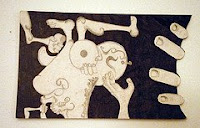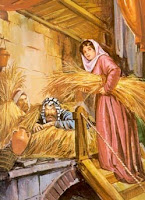 The women in my Bible study have been going through a difficult time recently. Every family has had a run of illnesses, from colds to gastro and flu. Most of the women are suffering from sleep deprivation, with young children and babies waking up many times a night. This post is for them - and for you!
The women in my Bible study have been going through a difficult time recently. Every family has had a run of illnesses, from colds to gastro and flu. Most of the women are suffering from sleep deprivation, with young children and babies waking up many times a night. This post is for them - and for you! We all have to cope with busy, difficult seasons of life. Pregnancy brings persistent nausea (don’t I know?!), aches and pains, and sleepless nights. New babies come with constant demands, breastfeeding difficulties, and those 3 or 6 o'clock moments when you’re forced out of bed feeling like you’ve been hit over the head with a sledge-hammer. Older children catch gastro, colds and flu, and generously pass them around the family. PMS can cause despondency or anger every month. Grief, sickness and depression steal time and energy from the rest of life.
How do you cope as a mother and homemaker during those times? Here’s some ideas.*
1. do only what’s necessary
The main thing is that your family has something to eat and wear. If you've fed your family off clean plates and put clean(ish) clothes on their backs, you've done what needs to be done.
2. simplify your tasks
Order take-away, take clothes to the laundromat, use the dryer, pay for a cleaner if you can afford it. If you must clean, clean only what you can see or smell.
3. let the real priorities surface
Care for your husband, cuddle your kids and let the rest slide. Dust balls and dirty sheets won't kill you. People matter more than places and things!
4. do what works
When I have a new baby I often let guilt do the talking: “I should settle my baby this way.” “Breast is best.” There are no rules in the Bible about these things! Do what works for you and your family. You might need some help to set up routines or encourage a child to sleep (feed-play-sleep is a simple and flexible approach) but remember these are just suggestions which may or may not work for you.
5. do the next thing
It's hard to drag yourself through your tasks when you're feeling sick, exhausted or discouraged. You don't have to do everything: just do one thing. Often that will get you moving so that you can do the next. But just one thing is good!
6. be prepared
This isn't always possible, of course! But if you know a difficult time is coming - a new baby, an absent husband - plan how you'll cope. Cook meals, or ask someone else to cook meals, and freeze them (a personal favourite!). Ask for help in advance. Work out what you'll do (e.g. call a friend) when things get tough. Organise babysitting or company if you need help with managing hormone-driven emotions. You need to do these now, while you’re thinking clearly!
 7. sleep when you can
7. sleep when you can If your new baby or sick child is sleeping, it's probably not the time to be racing around tidying. Get some sleep, put your feet up or go for a walk.
8. ask for and accept help
You weren't made to do it alone! Ask your husband to do the shopping. Ask a family member to vacuum your loungeroom. Ask a friend to cook some meals. Accept help when it's offered. God made you to be part of a community which serves one another: have the humility and wisdom to accept help.
9. trust God for the things that don’t get done
This is a great opportunity to remember that you’re a creature, not the Creator, and to learn to depend on God. Don't expect to be able to do everything: you're not God. Trust God for the things you have no time for.
* I've taken many of these ideas from these helpful posts, which you might like to read:
Carolyn Mahaney and daughters A Busy Woman's Survival Manual, managing busy seasons and busy time survival
Jess' post collected thoughts for new moms from Making Home
Nicole's post when my kids are sick from 168 hours
my post sleep deprived mamma from in all honesty
images are from diathesis & oksidor at flickr
16/7/2009






















